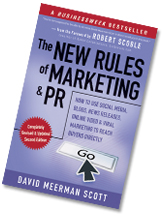 David Meerman Scott is a best-selling author and popular keynote speaker on the topics of viral and online marketing as well as the convergence of web marketing, digital media and online PR. One of his most popular books, The New Rules of Marketing and PR: How to use news releases, blogs, viral marketing and online media to reach buyers directly, was a real eye opener for a lot of companies trying to make sense of where blogs, press releases and search marketing fit together.
David Meerman Scott is a best-selling author and popular keynote speaker on the topics of viral and online marketing as well as the convergence of web marketing, digital media and online PR. One of his most popular books, The New Rules of Marketing and PR: How to use news releases, blogs, viral marketing and online media to reach buyers directly, was a real eye opener for a lot of companies trying to make sense of where blogs, press releases and search marketing fit together.
The second edition of The New Rules has recently been published and David will be keynoting the upcoming Search Engine Strategies conference in New York. I caught up with him just before SES and did a phone interview to get more insight into the new book, his insights into the emerging social media world including Twitter, Foursquare, Blogging and Content Marketing. I also asked him to share some practical advice for time management and how he stays current.
 The first edition of The New Rules of Marketing & PR was a real groundbreaking book for many marketers, bringing together web marketing and public relations strategies and tactics together. What’s new about the second edition?
The first edition of The New Rules of Marketing & PR was a real groundbreaking book for many marketers, bringing together web marketing and public relations strategies and tactics together. What’s new about the second edition?
First of all Lee, you were among the very first people in the world to to read the book and identify that it had something interesting to say and help talk it up. I appreciate that. There were a handful of people really early on in June 2007 who discovered the book, picked it up, read it and said wow, there’s something going on here.
The first edition came out June 2007 but I wrote it throughout 2006. If you remember in 2006, Twitter didn’t exist. Facebook was only for students, you had to have a .edu email address. Second Life was really being hyped. After the book was published for a few years, I’ve been getting emails nearly every day from people asking if I’d heard of a cool new service called Twitter that’s not in the book.
I had to update services and take a hard look at each of the examples in the book. I kicked out about 15 of them and added 25 – 30 new examples, so the new book grew a little bit in the number of pages. The examples are really interesting and really current. One of the challenges of writing a book is when you submit a manuscript, the book doesn’t come out for 6 months. Now, I wish I’d written about Foursquare, since that’s not in this new edition.
What is one of the biggest myths you’re seeing perpetuated about marketing on the web? About social media?
It’s not what I’d call a myth, but what I hear a lot are people who mistake these ideas that we’ve been talking about for 3-4 years with just being about Twitter and Facebook. People say, “I’m doing this Online Marketing thing, I’m on Twitter”. Or the opposite. They’ll say, “What are you talking about? This isn’t a form of marketing, it’s just a toy. Who cares what you had for lunch today.” I see this everywhere, all over the world as I go on the speaking circuit.
People confuse the broad ideas that we’ve been talking about, on how to reach people on the web in all of its forms with the “latest fad”. One of the fads out there is the phrase, “social media”. We didn’t use that untill recently. That fadish sort of phrase does a disservice to us getting the word out about the big picture of what you can do on the web. I continue to call it “the new rules of marketing and PR”. It’s just allowing us to create and publish content and get it out there. There’s lots of ways to do that. The labels and attempts to box it in can be limiting.
Let’s try some word association. I’ll mention a word or phrase and you tell me what comes to mind.
“Foursquare”: Newest hottest thing, I’m obsessed. Really interesting, fascinating. Foursquare was huge at SXSW.
“Twitter”: Twitter. Twitter. I think Twitter is with us for the long haul. I think Twitter is a real and valuable form of communication.
“Content Marketing”: People don’t know what the word “content” means. I wrote a book in 2005: Cashing in with Content. That book is just as well written and groundbreaking as The New Rules of Marketing and PR, but it suffers from a horrendous title. Because nobody associates content with marketing despite many people trying to make that association, including me. I am trying not to use phrase “content marketing” because many people don’t know what “conten”t means. I often use “information”. I learned my lesson. I wrote a really good book on the topic but no one has ever heard of it and followed it up with an international best seller in 24 languages. The major difference was use of “content” in the first book.
“Blogs”: A lot of people are saying blogs are dead. I don’t beleive that in the least. I think it’s the best way for people that are passionate about a subject to share that passion with the world. Have you heard some of this “Blogs are dead stuff?”
Lee: Yeah, I think of it this way. If you haven’t had the opportunity to learn how to use a tool in a way that results in positive outcomes, you can either decide to quit and call it dead or you can figure it out. I say that from a position of feeling very satisfied with our own blogging effort.
Recently I had the opportunity to interview Tom Peters, who said his best marketing is his blog. For many of us it’s huge. I interviewed Seth Godin as well and I’d guess that he would say a blog is a big part of his success. If you don’t do a very good job with blogging, it’s easy to dismiss. Many people are doing quite well. Social media and blogging is not an issue of either or. They work together.
“Viral Marketing”: I love the concept of viral marketing. The idea of people spreading ideas for you. There’s nothing better than people talking you up.
“Social Media Expert”: Ha ha. Snake Oil Salesmen. There are plenty of people that are very skilled at different aspects of social media and provide value in education and some execution. I just have to think there’s other people out there who really are just jumping on the latest bandwagon and don’t really have the skills that companies are looking for and may be doing a disservice to their clients.
Some of these people, were the same person in the 1970’s who opened a video center then a tanning salon in the 80’s then in 90’s web sites and then the late 90’s offered email and SEO and are now doing social media. It feels like whatever the hot topic is, there are peoples coming out of the woodwork claiming themselves as experts. Don’t get me wrong, there are many talented people out there, but it can be hard to tell who’s real. It can be hard for companies to tell because they don’t have the skills to see the difference.
Please share a few tips on how companies can decide where to start on the social web:
I think the best thing is to start where you’re comfortable. Decide what media you’re most comfortable with. Not everyone can write for example, so a blog might not be a good idea for them. Maybe photos or video is a better match or if you’re analytical, create charts & graphics that help people visualize critical concepts.
Forget about your own company and products. No one cares. Try to understand the people you’re trying to reach: the buyer persona. What problems can you solve for them? Then create content that helps them.
People coming into online marketing from an advertising agency or PR firm or even direct marketing all bring a different bias.
You’re like the energizer bunny, doing an amazing amount of work. What insights do you have for companies or individuals at companies on managing time and being efficient with social participation?
First, I would like to tell everybody: You have permission to say no. You have permission not to respond. A lot of people treat social sites like email – there’s an expectation that when you get a message you have to respond. You can do your best to be responsive, but there’s only so much time. I have a blog, I do videos, Twitter and FourSquare. However, I’m not on LinkedIn, not on MySpace and I don’t do a podcast. You have to pick and choose.
We all have pockets of downtime. Maybe you can take 5 minutes every 3 hours or so and take a quick look in the morning. Then again maybe after lunch. When you’re feeling productive, and this is very true in my case, you can really crank it out. That’s when it’s a good time to shut off access to other distractions. Today’s a great example. I just spent 5 days at SXSW and I’m so tired. It’s a perfect day to have a conversation with you. I couldn’t do a blog post today. There’s a right time and place.
The social web is still new to many companies and as a result, opportunists who are at best, “familiar users” of social apps, come across as “experts” without having actually implemented paid consulting for companies. The same has happened with web design and SEO. How much of a problem is this? Is it a problem at all?
There are a number of people that say because they have 10k followers they’re a Twitter expert. They actually do provide a lot of value because they can teach you to be a better user of the service. However, that’s very different than helping you to create a strategy in a company to grow a business.
How do you stay current and informed? Events, people, blogs/feeds, social tools, testing, magic 8 ball?
The main thing is that I’m so lucky to speak around the world and give presentations. Of course when I do that I get to meet lots of people that share their stories. Some are of success and some are about wanting to do more. I use those as my way of staying current. I first heard of Foursquare at a conference. In early February I was speaking at an event in Amsterdam. Some people were talking about Layar and how cool it was. I started using it and blogged about it. If I hadn’t been at that conference in Amsterdam I wouldn’t have heard about Layar. It’s really about getting out there, talking to lots of different people, listening and asking questions.
I live in fear of being a gray haired consultant that people look at and say, “He was really smart 10 years ago, but now he’s lost it”.
What are your thoughts on the future of the social web in 2-3 years?
We’re experiencing a revolution akin to when the telephone was invented or when the television was invented. There’s a new and fantastic way that we’re communicating today. Literally 100s of millions of people are communicating in new ways and the numbers of people and companies using social media are all growing. Some tools might not be growing like Second Life, but overall it is. We’re in the middle of a revolution. It’s important for people to recognize that this stuff is really growing.
What question should I be asking you? (And the answer of course)
One of the things I pay very close attention to is what’s going on outside of North America.
New Rules of Marketing and PR is published in 24 languages: From Vietnamese to Turkish to Bulgarian. It’s proof these ideas are working all over the world. I’ve been fortunate to deliver presentations in over 20 countries in the last 2 years. There are so many companies doing interesting things worldwide. There are so many social networks that are popular that we don’t know about. It’s a global phenomenon.
That’s fantastic, thank you for your time.
You can get more information about the various books written by David Meerman Scott here along with his blog. You can also see David presenting a keynote presentation at the upcoming Search Engine Strategies New York conference. For readers that are attending SES, I also invite you to attend the Digital Asset Optimization panel right after David’s keynote. Hope to see you there.
For even more of David’s insights, watch this video interview we shot at a past Minneapolis St. Paul Social Media Breakfast.


